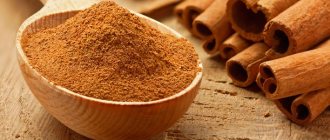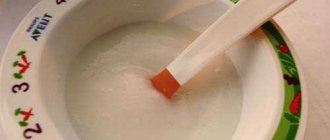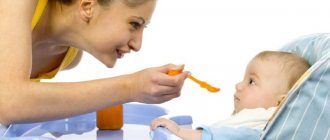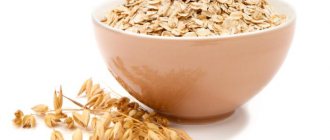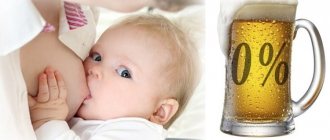Breastfeeding and mother's milk can not only improve the baby's immunity, but also make him healthier. However, in order for milk to truly make the baby healthier, the mother must be on a strict diet, limiting herself from eating allergens, baked goods, sweets, coffee and, of course, not drinking alcohol while breastfeeding.
If everything is clear with all of the above products, then there is no clear opinion about the prohibition of alcohol during breastfeeding. Although doctors strictly prohibit drinking it before the end of feeding, there are also doctors who allow its rare use in small doses.
The issue of whether or not to drink alcohol while breastfeeding requires a detailed understanding of what we will try to do through this article.
[Hide]
Opinions of nursing mothers about alcohol during breastfeeding
According to statistics, every seventh nursing mother drinks alcoholic beverages. Moreover, this category of women does not believe that a glass of beer or wine drunk with friends on a weekend or holiday can harm the baby if it enters his body with milk. In this case, we are not talking about female alcoholism and the negative impact of excessive consumption of alcoholic beverages on the toddler. If there is harm here, it is minimal, but this does not negate its presence.
Breastfeeding mothers, unlike doctors, have different opinions regarding the possibility of drinking alcoholic beverages while breastfeeding. The most correct and conscientious believe that alcohol is prohibited from the beginning of pregnancy planning, during gestation and until the end of breastfeeding. Doctors also share this opinion.
Others are of the opinion that it is possible to drink alcohol while breastfeeding, but only if it is small and rare. And the remaining minority believes that you can drink alcoholic beverages while breastfeeding if you follow a number of certain rules.
Before commenting on the points of view described above, we should consider the mechanism by which alcohol enters mother's milk, or more precisely, how quickly this happens, how quickly it is removed from there, and what other statements are associated with breastfeeding and drinking strong drinks.
Alcohol elimination table
On the Internet you can find many tables that you can use to calculate the time it takes to remove a drunk dose of alcohol from the body. Correctly determining a safe period of abstinence is very important for the mother; this will help avoid alcohol entering the baby’s body during breastfeeding.
Alcohol elimination table
The principle of all such tables is the same - the withdrawal time is indicated depending on the weight of the person and the strength of the drink. Next, you can calculate a specific period based on the amount you drink.
The indicators are noticeably different. So, 150 ml of wine leaves the body in about 2 hours. To cleanse from the same amount of vodka, a woman undergoing breastfeeding will need 14 hours. So when drinking strong drinks, you need to be prepared for the fact that the child will have to do without the mother’s breast for a long time and prepare for this in advance by making a reserve.
Attention! Strong alcohol, in principle, should be prohibited during lactation.
But if the desire to drink a glass of cognac suddenly appears during the period of breastfeeding and occupies all your thoughts, you should limit yourself to literally one sip, or even better, gather your will into a fist and abstain.
Alcohol and breast milk
Without exception, all alcoholic drinks contain ethanol and other substances that have a harmful effect on the body if their concentration in the blood is high, which most often happens with excessive alcohol consumption. All of them are harmful not only to women, but also to children. Molecular particles of ethanol easily penetrate from human blood into all tissue structures of the body. Therefore, the answer to the question regarding whether alcohol gets into milk will be definitely positive.
After a nursing woman drinks alcohol, it appears in the milk within an hour or an hour and a half. This temporary difference is determined by certain factors that affect the rate at which alcohol enters the blood and, accordingly, milk. They are presented:
- Weight of a nursing mother;
- The content of adipose tissue in her body;
- The amount of food eaten while drinking alcohol. If a woman drinks a strong drink, it will end up in the milk within half an hour.
- The same factors that occur when drinking alcohol affect its excretion from mother's milk.
A glass of wine or beer will be excreted from breast milk in about three hours. However, this time period will only be valid for those mothers whose weight is more than fifty-five kilograms. The thinner a woman is, the slower the removal of alcohol from her blood and milk.
Harmful substances in alcohol
Any alcoholic drink contains ethyl alcohol. Its quantity gives the degree of intoxication. The more ethanol, the stronger the liquid. Over the past few years, as a result of the substitution of concepts, the harmful effects of alcohol on the human body have been concealed.
In 1972, the GOST for ethyl alcohol was in force, which clearly stated that this is a flammable substance with a pungent odor, classified as a potent narcotic.
If we talk about small amounts of ethyl alcohol, they do not pose a danger to the body of an adult. Various medicines and tinctures are made on its basis. A minimum dose of alcohol can also be found in some food products: kvass, kefir, cheese, bread, fruits. The threat of modern alcohol lies in its poor quality, the addition of preservatives, taste regulators, flavorings - all this causes severe allergic reactions.
The degree of alcohol purification directly affects the amount of toxic substances in the product. Thus, a poorly purified drink contains:
- heavy oils, alcohols;
- methyls;
- phenols;
- ketones.
All these components in combination with ethanol cause irreparable harm to the main systems of the body. It is noteworthy that the high cost of the drink does not guarantee its high quality. For example, mature red wine contains sulfites, which cause a severe hangover. Any alcohol, even in small quantities, has a detrimental effect on human organs and systems.
Even a glass of wine can have an unpredictable effect on a baby
Harm of alcoholic drinks for mother and baby
Drinking alcoholic beverages can cause serious harm to the health of a toddler. No matter how rarely a mother drinks alcohol, even a small dose can lead to the development of the following consequences. After drinking milk that contains alcohol, the baby may experience depressed breathing, drowsiness and weakness.
If the mother drinks alcohol systematically, the child will have more serious health problems, such as:
- Lack of mass;
- Inflammatory processes in the gastrointestinal tract;
- Loss of appetite and increased colic;
- Delayed mental and physical development;
- Incorrect change of sleep phases and lack of a deep phase;
- Decreased blood pressure, general weakness.
The negative impact of alcohol-containing drinks on a child’s body during breastfeeding is clear. Alcohol also does not have the best effect on the female body. It not only affects her general condition, but also the process of breastfeeding. When alcohol gets into milk, the taste of the milk deteriorates, as a result of which the baby may refuse to latch on to the breast. In addition, milk containing alcohol is more difficult to suck out, which ultimately leads to a decrease in the sucking reflex and a decrease in milk production.
Alcohol consumption has a dulling effect on the mother's central nervous system, while caring for and feeding the child requires increased attention. And the older the little one gets, the more difficult it will be to keep track of him. And if the mother is in a relaxed state, she is unlikely to have time to orient herself in a critical situation in time, which can lead to serious injuries and injuries to the baby.
Volume of alcohol entering milk
Experts have proven that alcohol that enters the female body is absorbed faster than in men. Alcohol-containing products enter breast milk in a concentration of 10%. Therefore, even non-alcoholic beer is not a safe product for a baby whose mother is breastfeeding.
The percentage that the baby “gets” is influenced by the following factors:
- general condition of the woman’s body;
- presence of chronic diseases;
- volume of alcohol consumed;
- physical form of a young mother.
Note! If a woman has metabolic system disorders, the alcohol concentration reaching the baby increases to 20%.
Another important point is that an infant whose mother drank alcohol in large quantities seems to feel calmer and fall asleep faster. This is mistake! In such situations, the baby’s body is exposed to intoxication. Physical and emotional stress requires time to recover.
Myths and misconceptions
Some mothers claim that drinking beer increases lactation. This statement is incorrect. According to research, it was found that all drinks that contain alcohol lead to a decrease in milk production. If the baby lacks nutrition, he will begin to rapidly lose weight and get sick.
There are women who are sure that drinking alcohol after the birth of a child allows them to quickly restore emotional balance and put their nervous system in order. However, this statement is incorrect. This is what our ancestors believed, who not only drank alcohol themselves, but also gave it to their children so that they could sleep better. In some villages, such savagery is still practiced. A woman should not drink alcohol at all in the first three months after the baby is born. All babies are born with an underdeveloped and weak liver, so even a minimal dose of alcohol will cause the newborn to develop serious illnesses.
There is also a misconception that alcohol accumulates in breast milk and is not excreted. It is not true. It is cleared from the blood and milk within three hours after it enters there. You should not express milk after drinking alcohol. You just need to wait a little and then feel free to breastfeed your baby without fear of negative consequences.
When is ethanol inactivated and removed from the female body?
It should be said that ethanol is absorbed by the female body faster than the male body, causes great destruction and is excreted more slowly. About 10% alcohol gets into the milk.
Ethanol decomposes and is excreted depending on 7 factors:
- From the woman's body weight.
- Detoxification capacity of the liver.
- Ratio of muscle mass and fat (volume of body fat).
- Emotional state (under stress, alcohol is deactivated faster).
- Health conditions.
- Alcohol content of the drink.
- The volume of drinks.
There are other factors that influence the intake, breakdown and removal of alcohol. Usually, a nursing mother has a need to drink beer, wine or a glass of champagne.
Beer
After 200 ml of beer, a nursing mother’s body will recover in about an hour, after a bottle it will take up to 5 hours, if the weight is small, about 60 kg. Large women will get rid of the ethanol contained in a bottle of beer in 2-2.5 hours.
Wine
Wine is excreted in slim women in 2.5 hours (100 ml) and in 8 hours (300 ml). Donuts get rid of ethanol 2 times faster.
Champagne
Champagne easily and quickly penetrates fabrics and does not leave them for a long time. For nursing mothers weighing 60 kg, 300 ml of champagne stays in the body for up to 4 hours. Fat ladies have an hour less.
Table for the removal of alcohol from a woman’s body
The table below provides information on the rate at which ethanol is eliminated from the body.
Please note that we are talking about the breakdown of alcohols; breakdown products are removed with biological fluids. If you drank a glass of beer and did not express after 3-4 hours, toxins remain in the milk.
| The period of complete elimination of alcohol from the body | ||||
| Alcohol strength | ml. | Person weight 60 kg | Person weight 70 kg | Person weight 80 kg |
| 4 % | 100 300 500 | 35 min. 1 hour 44 minutes 2 hours 54 minutes | 30 min. 1 hour 29 minutes 2 hours 29 minutes | 25 min. 1 hour 18 minutes 2 hours 11 minutes |
| 6 % | 100 300 500 | 52 min. 2 hours 37 minutes 4 hours 21 minutes | 45 min. 2 hours 14 minutes 3 hours 44 minutes | 39 min. 1 hour 57 minutes 3 hours 16 minutes |
| 9 % | 100 300 500 | 1 hour 18 minutes 3 hours 55 minutes 6 hours 32 minutes | 1 hour 07 minutes 3 hours 21 minutes 5 hours 36 minutes | 59 min. 2 hours 56 minutes 4 hours 54 minutes |
| 11 % | 100 300 500 | 1 hour 36 minutes 4 hours 47 minutes 7 hours 59 minutes | 1 hour 22 minutes 4 hours 06 minutes 6 hours 50 minutes | 1 hour 12 minutes 3 hours 35 minutes 5 hours 59 minutes |
| 18 % | 100 300 500 | 2 hours 37 minutes 7 hours 50 minutes 13 hours 03 minutes | 2 hours 14 minutes 6 hours 43 minutes 11 hours 11 minutes | 1 hour 57 minutes 5 hours 52 minutes 9 hours 47 minutes |
| 24 % | 100 300 500 | 3 hours 29 minutes 10 hours 26 minutes 17 hours 24 minutes | 2 hours 59 minutes 8 hours 57 minutes 13 hours 03 minutes | 2 hours 37 minutes 7 hours 50 minutes 13 hours 03 minutes |
To be fair, it should be said that 10% ethanol from a drink containing 4-6% alcohol (beer) or 11% (champagne) is not much. But remember, the child’s liver is not mature enough to deal with poisons. But the baby is already struggling with toxins, faced with microbial intoxication or pesticides received by the mother’s body with food.
Do the above opinions apply?
At the beginning of the article, you could read the opinions of nursing mothers regarding whether it is worth drinking alcoholic beverages while breastfeeding. After studying the consequences of drinking alcohol during breastfeeding, the mechanism, time of its entry into milk and removal from it, as well as common myths regarding this issue, you can understand what data is taken as their basis.
Mothers who strictly monitor their diet and refuse strong drinks during breastfeeding are simply trying to ensure that their baby receives only benefits from milk. Perhaps for this they will have to sacrifice their desires and give up their wishes, but even so, they remain faithful to their choice. For them, the baby's health is most important. And other mothers can only envy the dedication and endurance of these women.
Those nursing mothers who believe that drinking alcoholic beverages in small doses is acceptable are partly right, since their opinion is confirmed in the works of foreign scientists. They describe that one or even two glasses of red wine per week for a nursing woman is a completely acceptable dosage. In addition, foreign pediatricians consider ethanol to be a medicine and therefore allow its use by nursing mothers.
The last group of mothers who follow a number of rules when drinking alcohol are based on the physiology of the processes of penetration and release of the standard into breast milk and back. They are guided by the following rules:
- You should not drink strong drinks until your baby is six months old;
- Before drinking alcohol, you need to express the milk into bottles and put it in the refrigerator, where it can be stored for 24 hours until the alcohol is completely released from the “fresh” milk;
- You should clearly remember the time of drinking an alcoholic drink;
- You can feed your baby three hours after drinking a glass of wine or beer. And if two of them were drunk, then only after six hours.
- You should not drink strong alcohol, as it takes a very long time to be excreted from milk.
- Also, you should not drink on an empty stomach. While drinking strong drinks, you should definitely eat.
How long after can you feed your baby?
After a dose of alcohol, you can breastfeed your baby no earlier than ethanol has completely disappeared from the body and, accordingly, from breast milk. To be more confident in the safety of feeding, it is better for a woman to wait a little longer than the estimated period.
If a mother drinks a glass of wine, she can feed her baby within 3-3.5 hours. Drinking strong alcohol during lactation is strictly not recommended, but if this does happen, then the break between drinking alcohol and feeding should be at least half a day. A more accurate calculation can be made based on the amount of drink and the woman’s weight.
The woman’s well-being is also important. You can feed only after the intoxication has completely passed and the mother is absolutely sober and adequate.



